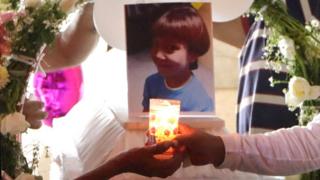Home » Latin America »
Mexican police arrest suspects in child murder
Mexican police have arrested a couple suspected of kidnapping, torturing and murdering a seven-year-old girl whose body was found dumped in a bin bag.
Fátima Aldrighett disappeared after leaving school in Mexico City on 11 February. Her body was discovered with signs of abuse four days later.
On Wednesday, police detained a man and a woman after finding items at a house linking them to her disappearance.
Mexico City Mayor Claudia Sheinbaum confirmed the arrests in a tweet.
“The alleged perpetrators of the femicide of the minor Fátima Cecilia [Aldrighett] were detained in a town in the State of Mexico with the support of the National Guard,” the mayor wrote.
How were the suspects traced?
On the day Fátima disappeared, a surveillance camera outside her school captured her with an unknown woman.
The footage was shared by the authorities and the woman was later identified by police thanks to a tip-off from her landlord.
An apartment in the Xochimilco area of the capital, not far from where Fátima lived with her family, was later searched.
The female suspect had fled her apartment, but photographs, Fátima’s shoes and sweater and the clothes the female suspect wore on the day of the girl’s abduction were discovered, police said.
A reward of two million Mexican pesos (£83,000; $108,000) was offered for information that would lead police to the woman, believed to be between 42 and 45 years old, according to the prosecutor’s office.
On Tuesday, prosecutors released pictures of two suspects, a woman and a man.
At about 15:00 (21:00 GMT) on Wednesday, police used a drone to search for the suspects and were able to locate the pair, El Universal newspaper reported.
What happened to the girl?
Fátima Aldrighett was waiting for her mother to pick her up outside her school in Mexico City when she disappeared on the afternoon of Tuesday 11 February.
Local media reported that her mother had been caught in traffic and was running late, and that the girl had been left to wait outside the school on her own.
The family reported her missing after searching the area with no success.
Four days later, on Saturday, her body was found in a plastic bag in the city’s Tláhuac neighbourhood.
At her funeral on 18 February, Fátima’s uncle, Fernando Anton, said the family were lucky to have had her.
A neighbour attending the service, Saira Dia, said people in the community needed to support one another.
“The girl didn’t have anyone to go with [after school]. We need to be aware that if we see a child waiting for their parents to pick them up… we wouldn’t like the same thing to happen to us,” she said.
What has the reaction been?
The case has caused outrage in Mexico, with hundreds of thousands of people tweeting the hashtag #JusticiaParaFatima (#JusticeForFatima).
Relatives have criticised the authorities over their handling of the case, saying police and officials acted too slowly.
“Fátima is not with us because the protocols were not followed, because the institutions did not give it the attention they should have,” said the girl’s aunt, Sonia López.
Ms López said that even before the girl’s disappearance, Fátima’s mother, who has health problems, did not receive the support from social services that she should have.
Mexico City’s Attorney General, Ernestina Godoy, said there would be an investigation into how the case was handled.
An average of 10 women or girls are murdered every day in Mexico and the girl’s body was found a week after the brutal murder of Ingrid Escamilla, a 25-year-old found killed and dismembered in the home she shared with her partner, who told police he had stabbed her and had tried to dispose of her body.
Mexico’s left-wing President, Andrés Manuel López Obrador, has been criticised for seeking to blame his predecessors’ “neoliberal policies” for gender-based violence.
The president spoke out after protesters daubed slogans on the outside of the National Palace.
“I ask all the feminists, with due respect, don’t paint on our doors and our walls, we are working to stop femicides. Don’t confuse us with repressors, we know how to respond to provocation,” he said.
Source: Read Full Article



